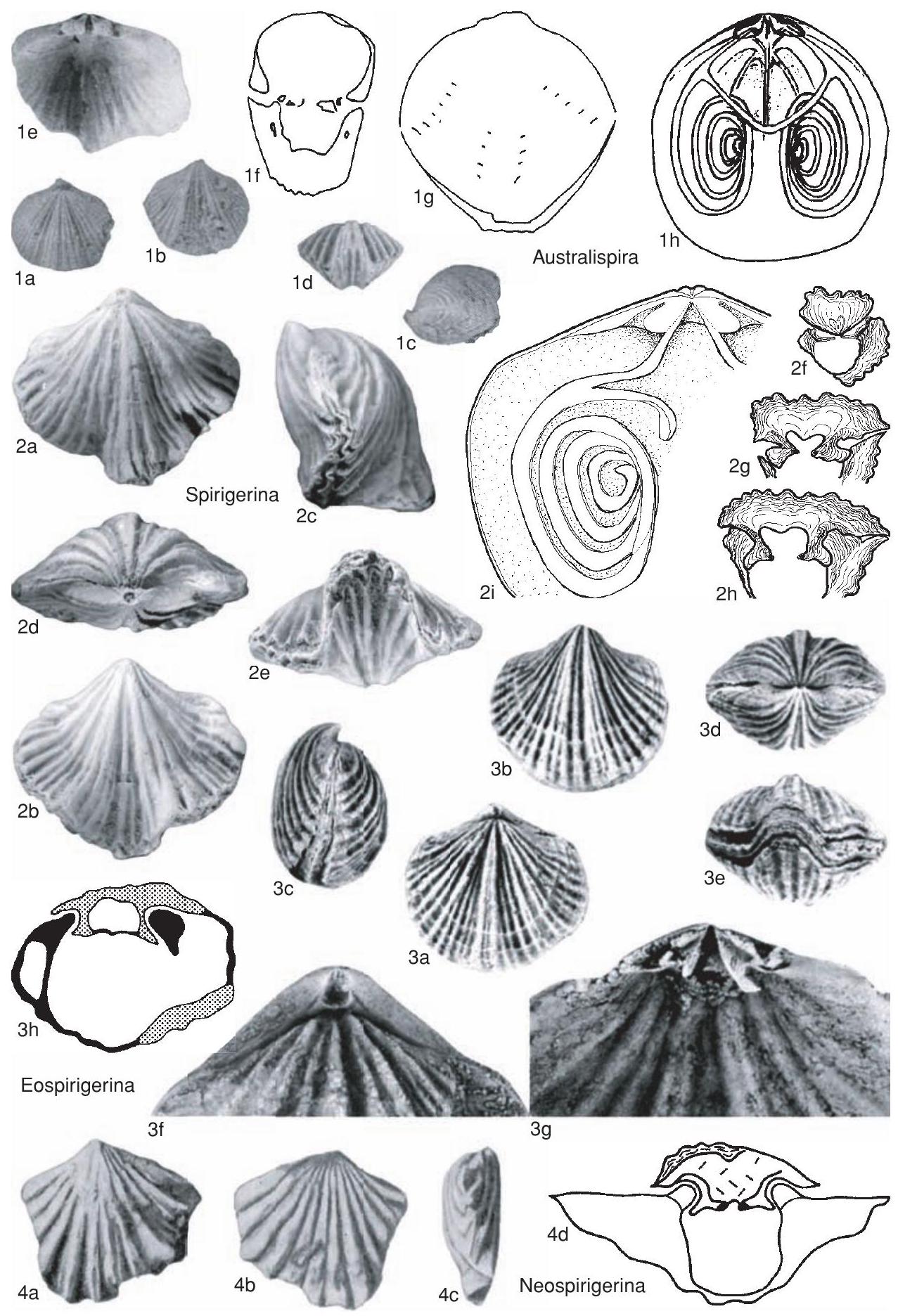Welcome to the Treatise on Invertebrate Paleontology!
Please enter a genera name to retrieve more information.

Eospirigerina
Classification
Phylum:
Brachiopoda
Subphylum:
Rhynchonelliformea
Class:
Rhynchonellata
Order:
Atrypida
Suborder:
Atrypidina
Superfamily:
Atrypoidea
Family:
Atrypinidae
Subfamily:
Spirigerininae
Formal Genus Name and Reference:
Eospirigerina Boucot & JOHNSON, 1967a, p. 90
Type Species:
Zygospira putilla Hall in Hall & Clarke, 1895, p. 365, vid. Hall, 1894, p. 653, SD Amsden, 1974, p. 72, =Atrypa praemarginalis Savage, 1913a, p. 84, OD, vid. AMSDEN, 1974, p. 72
Images
(Click to enlarge in a new window)
Fig. 970, 3a-h. *E. putilla (Hall), upper Ashgill, Missouri, USA, a-e, dorsal, ventral, lateral, posterior, and anterior views, x2, f-g, dorsal interior, exterior, x5, h, serial section, x3 (Amsden, 1974).
Synonyms
Zanclorhyncha, Eorhynchula, Neorhynchula
Geographic Distribution
worldwide
Age Range
Beginning Stage in Treatise Usage:
Ordovician (middle Ashgill)
Beginning International Stage:
Katian
Fraction Up In Beginning Stage:
85
Beginning Date:
446.34
Ending Stage in Treatise Usage:
Silurian (Llandovery)
Ending International Stage:
Telychian
Fraction Up In Ending Stage:
100
Ending Date:
432.93
Description
Subquadrate to shield shaped, dorsibiconvex; small orthoclineanacline area; apical to transapical foramen, flanked by small deltidial plates; ribs fine to medium size, to fading laterally to sometimes nearly smooth, expanding and coarsening anteriorly; ventral diverging, furcating raised midrib clusters forming weak margins to ventral sulcus; ribs continuous or with partly developed growth lamellae anteriorly; strong, U-shaped anterior fold; short, stout teeth; small, subhorizontal, slitlike dental cavities; crura strong; dorsomedial spiralia with fewer than 12 whorls; jugal processes delicate. [Distinguished from Spirigerina by generally finer ribs, poorly defined midribs along fold margins, lacking microfilae, very short growth lamellae or growth interruptions commonly present, thin hinge plates, distinguished from Qilianotryma by coarser ribs, and rib-defined anterior fold, neanic specimens may be mistaken for Atrypina.]
References
Museum or Author Information
Classification
Phylum:
Brachiopoda
Subphylum:
Rhynchonelliformea
Class:
Rhynchonellata
Order:
Atrypida
Suborder:
Atrypidina
Superfamily:
Atrypoidea
Family:
Atrypinidae
Subfamily:
Spirigerininae
Formal Genus Name and Reference:
Eospirigerina Boucot & JOHNSON, 1967a, p. 90
Type Species:
Zygospira putilla Hall in Hall & Clarke, 1895, p. 365, vid. Hall, 1894, p. 653, SD Amsden, 1974, p. 72, =Atrypa praemarginalis Savage, 1913a, p. 84, OD, vid. AMSDEN, 1974, p. 72
Images
(Click to enlarge in a new window)
Fig. 970, 3a-h. *E. putilla (Hall), upper Ashgill, Missouri, USA, a-e, dorsal, ventral, lateral, posterior, and anterior views, x2, f-g, dorsal interior, exterior, x5, h, serial section, x3 (Amsden, 1974).
Synonyms
Zanclorhyncha, Eorhynchula, Neorhynchula
Geographic Distribution
worldwide
Age Range
Beginning Stage in Treatise Usage:
Ordovician (middle Ashgill)
Beginning International Stage:
Katian
Fraction Up In Beginning Stage:
85
Beginning Date:
446.34
Ending Stage in Treatise Usage:
Silurian (Llandovery)
Ending International Stage:
Telychian
Fraction Up In Ending Stage:
100
Ending Date:
432.93
Description
Subquadrate to shield shaped, dorsibiconvex; small orthoclineanacline area; apical to transapical foramen, flanked by small deltidial plates; ribs fine to medium size, to fading laterally to sometimes nearly smooth, expanding and coarsening anteriorly; ventral diverging, furcating raised midrib clusters forming weak margins to ventral sulcus; ribs continuous or with partly developed growth lamellae anteriorly; strong, U-shaped anterior fold; short, stout teeth; small, subhorizontal, slitlike dental cavities; crura strong; dorsomedial spiralia with fewer than 12 whorls; jugal processes delicate. [Distinguished from Spirigerina by generally finer ribs, poorly defined midribs along fold margins, lacking microfilae, very short growth lamellae or growth interruptions commonly present, thin hinge plates, distinguished from Qilianotryma by coarser ribs, and rib-defined anterior fold, neanic specimens may be mistaken for Atrypina.]
